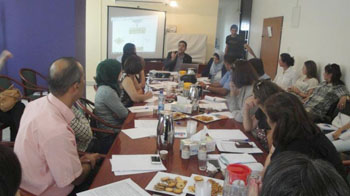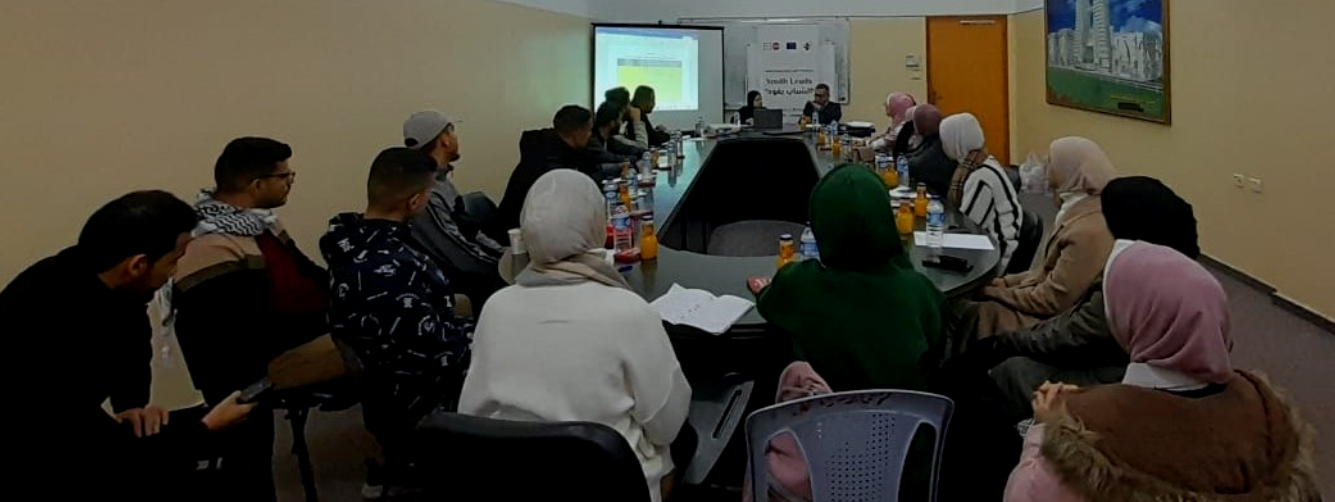
Ramallah -- As part of its program to promote community dialogue and impact general policies and its interest in laws and resolutions pertaining to peace and security for Palestinian women, MIFTAH held a hearing along with member of the Resolution 1325 coalition and legal experts. The session was also attended by MIFTAH’s work team and some members of the youth network, which MIFTAH looks to develop. The session was aimed at briefing and listening to developments pertaining to the 15 treaties signed by President Mahmoud Abbas on April 1, which include:
The Fourth Geneva Convention regarding the laws and conventions in times of wars and their protocols: the laws and conventions regarding war; the International Convention on the Suppression and Punishment of the crime of Apartheid; the International Convention on the Prevention and Punishment of the crime of Genocide; the UN Convention against Corruption; Convention against Torture and Other Cruel, Inhuman or Degrading Treatment or Punishment; United Nations Declaration on the Elimination of All Forms of Racial Discrimination; the Vienna Convention on the Law of Treaties; the Convention on the Rights of Persons with Disabilities; Convention on the Elimination of All Forms of Discrimination against Women; Optional Protocol to the Convention on the Rights of the Child on the Involvement of Children in Armed Conflict; the Vienna Convention on Diplomatic Relations; the Vienna Convention on Consular Relations; the four Geneva Conventions; Protocol Additional to the Geneva Conventions, relating to the Protection of Victims of International Armed Conflicts; The International Covenant on Civil and Political Rights; International Covenant on Economic, Social and Cultural Rights and its impact on the human rights situation in Palestine.
The participants listened to a presentation by Dr. Omar Awadallah on the efforts exerted by the foreign ministry in promoting these conventions. He also briefed them on the efforts being made to prepare a comprehensive report on the status of human rights in the Palestinian territories, which will be presented to the UN next May.
Project director at MIFTAH, Najwa Yaghi opened the session by indicating that this was part of the program for promoting social dialogue, given MIFTAH’s interest in international conventions relevant to achieving peace and security for Palestinian women.
Reaffirming the role of civil society organizations
In his presentation, Dr. Awadallah gave a list of findings including: integration between ministries, government institutions and civil society organizations, pointing out that the conventions signed by President Abbas were important ones, especially those related to human rights. He said civil society played a ‘supporting and parallel role’ to the government in applying these conventions.
He also explained the composition of the report, saying it was in five parts: international law and an introduction to Palestinian law and rights on the ground; an analysis of international law in relation to Palestinian legislation and policies; and evaluation, which he said was the role of civil society. The government, he explained, had the task of writing and preparing reports and documentation, especially in regards to the Israeli offensive on the Gaza Strip and the war crimes committed. Awadallah stressed on the need to record the Palestinian historical narrative.
Embodiment of the legal personality
Dr. Awadallah stressed on the political dimensions of Palestine joining these agreements, which was realized on November 29, 2012 when Palestine obtained the status of an observer state at the UN, thus achieving the status of a legal personality and promoting Palestine as a state in the world. He also stressed that the improvement of the human rights situation in the occupied Palestinian territories was a priority with the leadership and civil society.
The importance of the signed agreements
The significance in the signed agreement s lies in their connection to the contracting international bodies, which follow up on the implementation of these agreements; this means the State of Palestine is committed to them as well.
Abdallah mentioned seven agreements signed by Palestine, adding that four others needed reports to be submitted a year after the date Palestine became a member, which will be next May.
International Criminal Court
Dr. Abdallah then stressed that the ICC was one of the most important international institutions that Palestine must join, explaining that the crimes committed by Israeli occupation forces did not have a statute of limitation. He said there would be special tribunals formed for holding Israel accountable in addition to individual complaints filed in countries with legal jurisdiction to allow the trial of war criminals.
He addressed the possibility of the Palestinian resistance being held accountable for its actions as well, saying that international humanitarian law is clear on the forms of resistance. He went on to say that the UN General Assembly passed a resolution on the right of peoples to resist including through armed struggle, but added that this does not mean targeting civilians, taking them hostage or using them as human shields. Dr. Abdallah explained that international law could be used to show that if you are defending yourself and what you did was less atrocious than your enemy, you will not be held accountable.
Dr. Abdallah rejected the premise of any relationship between the negotiations and the decision to join the ICC and hold Israel accountable for its actions, but said there were little details that had to be smoothed out before this could happen.







